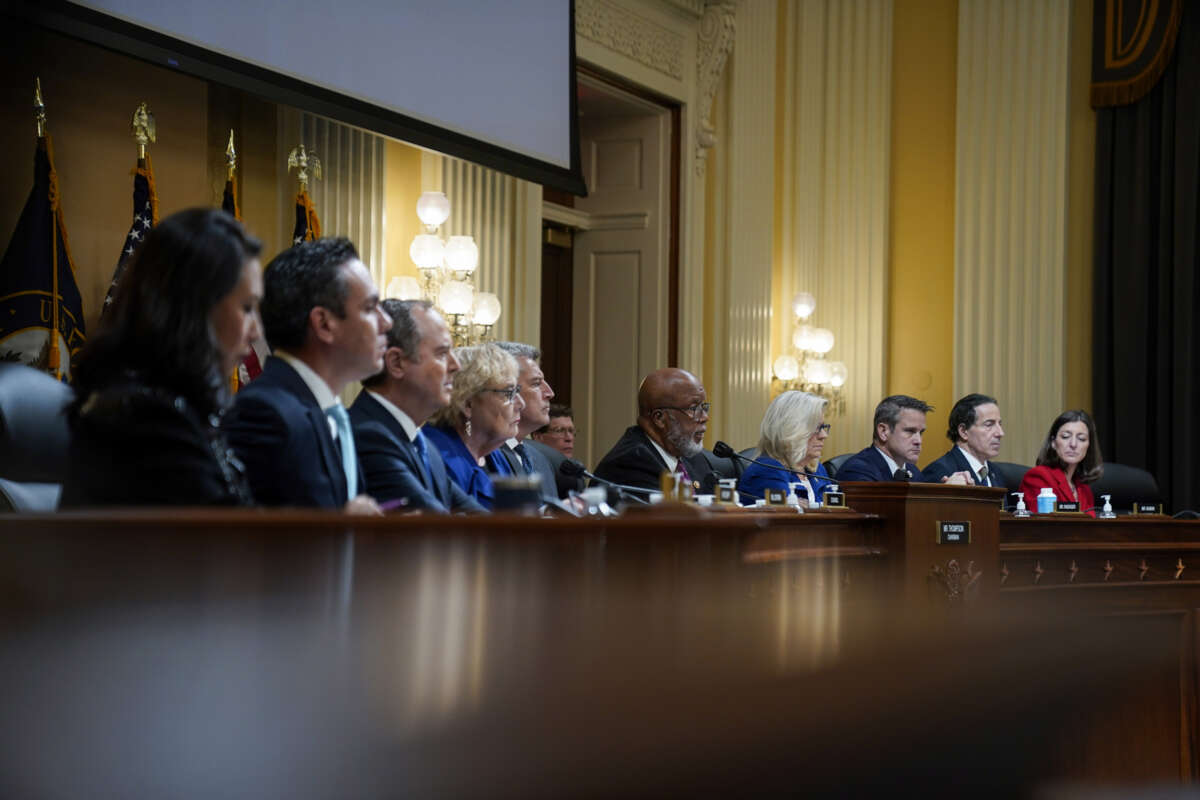Truthout is a vital news source and a living history of political struggle. If you think our work is valuable, support us with a donation of any size.
The House select committee investigating the January 6, 2021, attack on the U.S. Capitol building will meet later this week to discuss its final report and the possibility of forwarding additional criminal referrals to the Department of Justice (DOJ).
The department is already investigating attempts by Trump and his allies to overturn the 2020 presidential election. But criminal referrals from the committee may hold weight for the DOJ, as the committee could have evidence that the department hasn’t yet considered, including witness testimony.
A subcommittee of panel members will provide the broader committee with options to consider when it meets this Friday, including the option to forward criminal referrals to the Justice Department; such referrals could relate to obstruction of the committee’s work by outside individuals, possible perjury by witnesses or witness tampering by pro-Trump allies.
Vice chair of the committee Rep. Liz Cheney (R-Wyoming) noted at the end of a hearing in late June that several witnesses had reported that people in Trump’s circle had contacted them in attempts to “influence or impact their testimony.”
The January 6 committee will also consider on Friday whether to recommend that the DOJ charge five Republican lawmakers who refused to comply with subpoenas to give depositions to the panel. Among those lawmakers is House Republican leader Kevin McCarthy (California), the next presumptive Speaker of the House, who, along with his GOP allies, is expected to disband the committee when he assumes power over the chamber in January.
If the committee decides to recommend contempt of Congress charges against the five lawmakers, their recommendations would be subject to a full House vote before being sent to the DOJ.
The committee’s previous criminal referrals to the Justice Department have had varying levels of success. While the DOJ accepted the committee’s recommendation to press contempt of Congress charges against Trump’s former top political aide Steve Bannon, ultimately resulting in a successful prosecution, the department has disregarded other recommendations, including contempt of Congress charges against former Trump chief of staff Mark Meadows.
Still, the committee could decide that it’s necessary to issue new recommendations, some of its members said.
“We will be discussing whether to make referrals, and if so on whom and for what,” Rep. Adam Schiff (D-California) said. “We are considering any offenses for which we have uncovered relevant evidence and think there is a basis for a referral.”
Schiff added that the committee’s referrals to the DOJ could include charges against Trump, though no decision on any individual has been made.
The committee will also be discussing aspects of its final report, which, according to committee chair Rep. Bennie Thompson (D-Mississippi), could be released before the Christmas holiday, although it likely won’t be ready until at least December 16.
Thompson told reporters on Wednesday that the report will have eight chapters in total, and could include information that the committee has unearthed since its last public hearing. Members may hold a new public hearing to showcase revelations in the report that have not yet been disclosed, but they haven’t made definitive plans so far. Thompson added that the committee is wrapping up its work, noting that members face an end-of-year deadline due to the possibility that the committee will be dissolved by Republicans in January.
Media that fights fascism
Truthout is funded almost entirely by readers — that’s why we can speak truth to power and cut against the mainstream narrative. But independent journalists at Truthout face mounting political repression under Trump.
We rely on your support to survive McCarthyist censorship. Please make a tax-deductible one-time or monthly donation.
